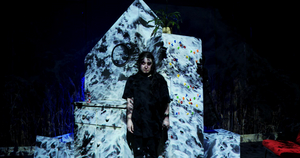Review: FRIDGE, The Hope Theatre
A creative exploration of mental illness and the rural/city divide

![]() Often shows in their early stages can be about throwing all the ideas at a wall and seeing what sticks. This was the impression given by Fridge at the Hope Theatre. That's not to say, however, that these ideas aren't exciting or that the show doesn't have potential - quite the opposite.
Often shows in their early stages can be about throwing all the ideas at a wall and seeing what sticks. This was the impression given by Fridge at the Hope Theatre. That's not to say, however, that these ideas aren't exciting or that the show doesn't have potential - quite the opposite.
Fridge, written by Emma Zadow and directed by Anoushka Bonwick, tells the story of two sisters. Lo (Gabrielle De Saumarez) struggles with her mental health, still living in their childhood home in rural Norfolk and trying to escape into the worlds of Disney and cartoons. Alice, meanwhile, played by writer Zadow, is the one who made it out - now an estate agent, she comes back to help out with Lo in their mother's absence.
In the meantime, Lo is being looked after by Charlie (Edward Watchman), Alice's childhood best friend who also never left and now works on a farm. The play follows this unconventional family as they navigate the rural/city divide and the challenges it has brought into their lives.
On walking into the Hope's intimate pub theatre space, audiences are greeted by an immediately arresting set: designer Erin Fleming transforms the stage area into something both homely and mystical. A fridge takes pride of place, decorated with coloured letter magnets, and the whole set is painted white. This is to allow for the projections that are used throughout the show to illustrate the 'TV world' into which Lou is always trying to escape: video and sound designer Rodrigo Pacheco does a fantastic job at breaking away from the realism of the dialogue scenes and bringing us into what feels at its best like a different dimension.
The lighting is also outstanding, especially for a small pub theatre space, with designers Gareth Morgan and Bethan Amey paying attention to every little detail of the script so as to adapt the space as best as possible. Director Bonwick also uses the thrust layout to her advantage, especially in scenes where characters watch others from doorways and corners.
All three actors give very strong performances: there's no one standout, but instead they work best as a unit of three. De Saumarez bubbles with intensity throughout, never shying away from the most difficult and messy aspects of her character. She particularly shines in her monologues, surveying the audience with an almost uncomfortable level of focus. Zadow gives a quieter performance, genuine and natural, while Watchman tackles a tricky role in a way that makes him immensely likeable.
The script feels like it needs to be chiselled down, chipped away at it to get to its real heart. At least 20 minutes could be cut, as much of the first half is taken by the same few arguments repeated over and over. There are some stunning moments: a scene where Alice and Charlie reminisce over their teenage years, getting drunk on blueberry vodka the night after A-Level results, is particularly touching, as is one where Lo and Charlie find a new level of companionship over their feelings of being left behind. At other points, the writing becomes too obvious, with the subtle turning points in each of these relationships being signposted slightly too markedly.
In the programme, Zadow writes about how with Fridge she wanted to tackle the lack of mental health support for young people in rural areas; this is something that could have been further explored in the script itself. She does well at showing the messy realities of mental illness, and the way it can hugely impact friends and family, but steers the play away from what's really going on with Lo. We don't know what her condition is, or how long she's had it, or in what ways she or the family have sought out help. It feels somewhat like the play is more interested in depicting mental illness than directly engaging with it.
So what sticks? The themes of classism, of family, and especially of the rural/city divide work so well on stage and are written and performed with honesty and creativity. The set, projection, and lighting are exciting, transforming the pub theatre space. The performances are fantastic. Fridge has all the components of an excellent piece of theatre - they just need bringing to the surface.
Fridge runs at The Hope Theatre until 2 April
Reader Reviews

Videos
